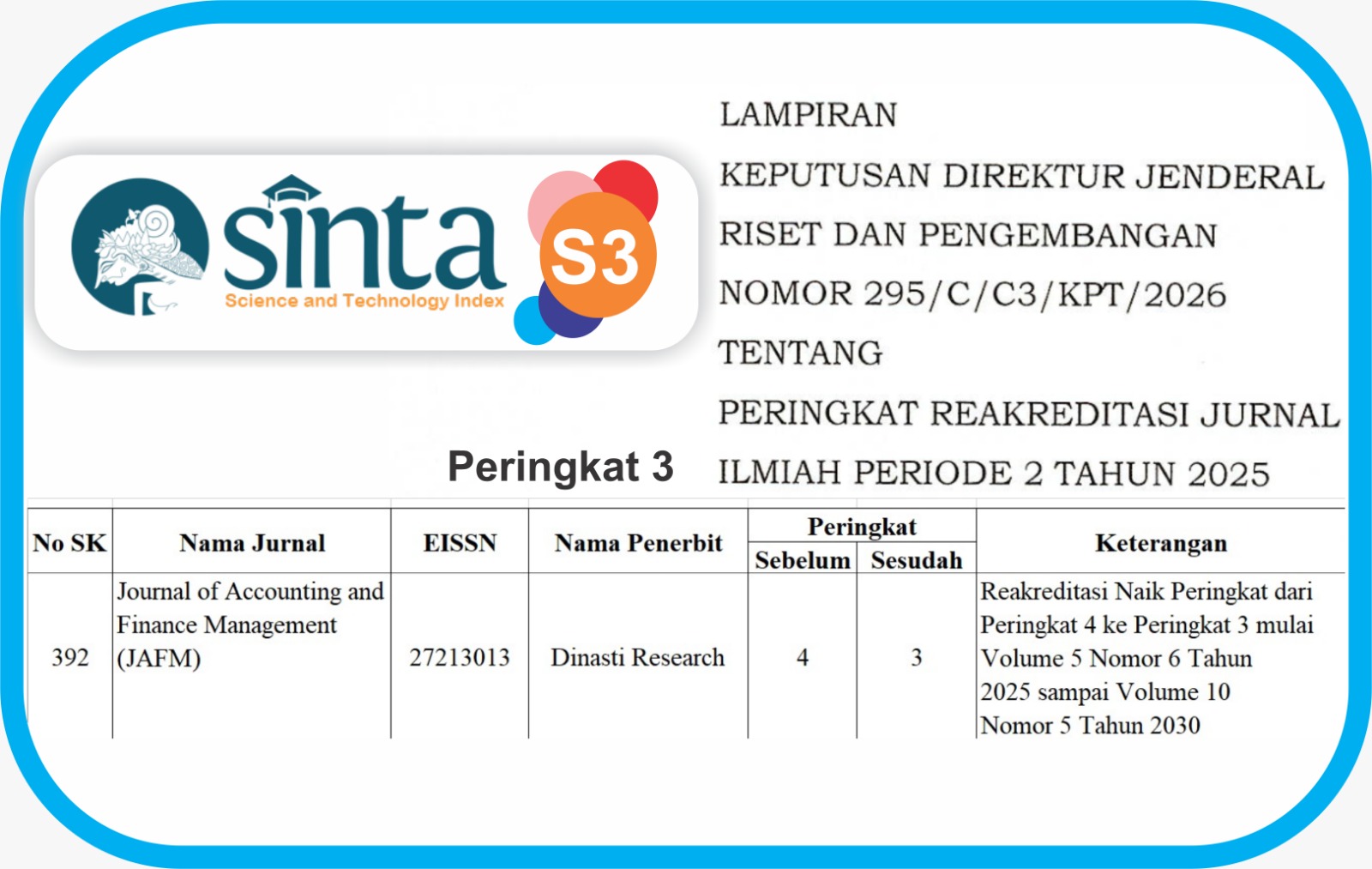Millenial Employees Perception Related to Workload, Work Life Balance, Challenge Leadership on Happiness at Work Case Study Kuningan Area South Jakarta
DOI:
https://doi.org/10.38035/jafm.v4i2.219Keywords:
Workload, Work Life Balance, Challenge Leadership, Happiness at WorkAbstract
The purpose of this study is to analyze the perception millenial employees about workload, work life balance and challange leadership on happiness at work. This study used quantitative data types with the population of this study are employees worked in Kuningan Area South Jakarta. The sample used in this study are 100 respondents. The methode used for data collection is by used a questionnaire distribution technique trough google form. The analysis technique in this study used the inner model andouter model test wich were processed and analyzed using SmartPLS software which is equipped with variable descriptions of each respondent’s characteristics. The results of this study showed that the workload had a significant effect on happiness at work, work life balance had a significant effect on happiness at work, challenge leadership had a significant effect on happiness at work, workload had no significant effect on challenge leadership, work life balance had a significant effect on leadership. Concequently millenials do not query about workload but work life balance are the primary reason, and challange leadership to experience hapiness at work.
References
Badan Pusat Statistik (BPS). (2021). Hasil Sensus Penduduk Tahun 2020.
Budiati, I. , Yuni S. , Windhiarso P.A. , Sofaria A. , Henri A.R. , Putri L. , Nia S. , Aprilia I.P. & Valent G.S. (2018). Statistik Gender Tematik. Jakarta. Kementerian Pemberdayaan Perempuan dan Perlindungan Anak.
Chandra, D.O., Aida V.S.H., Dadang S.(2017). Kepuasan Kerja Generasi X dan Yterhadap Komitmen Kerja di Bank Mandiri Palembang. Jurnal Aplikasi Bisnis dan Manahemen, 3 (1), 12-22.
Deloitte.com. (2019). Generasi Millenial dalam Industri 4.0: Berkah bagi Source Daya Manusia atau Ancaman?. Diperoleh dari https://www2.deloitte.com/content/dam/Deloitte/id/Documents/about-deloitte/id- about-dip-edition-1-chapter-2-id-sep2019.pdf
Fisher, B. d. (2009). Beyond Work and Family: A Measure of Work/Nonwork Interference and Enhancement. Journal of Occupational Health Psychology, 12 (1), 441 – 456
Ghozali, I. (2021). Partial Least Squares Konsep Teknik dan Aplikasi menggunakan Program SmartPLS 3.2.9 untuk Penelitian Empiris. Semarang: Badan Penerbit Universitas Diponogoro.
Hidayatullah, S., Waris, A., Devianti, R. C., Sari, S. R., Wibowo, I. A. & PW, P. M. (2018). Perilaku generasi millenial dalam menggunakan aplikasi go food. Jurnal Manajemen & Kewirausahaan, 6 (2), 240-249.
Isa, K., Tenah, S., S., Atim, A. & Jam, A., M. (2019). Leading Happiness: Leadership and Happiness at a Workplace. International Journal of Recent Technology and Engineering, 8 (3), 6551 – 6533.
Jannah, F. & suryani, I. 2020. Pengaruh Work Life Balance terhadap Kebahagiaan yang dimediasi oleh Self – Esteem pada Karyawan Sektor Perbankan Kota Banda Aceh. Jurnal Manajemen Inovasi, 11 (1), 124 -137.
Jobstreet (2020). Covid 19 Job Report. Diperoleh dari www.jobstreet.co.id/en/cms/employer/wp-content/themes/jobstreet employer/assets/report/covid-19-job-report-id/JobStreet-COVID-19-JOB-REPORT- INDONESIA-FINAL-27082020.pdf
Kouzes, J., & Posner, B. (2012). Thae Leadership Challenge. California: Wiley.
Mahani, D.S., Isa M. & Reny I. (2020). Beban Kerja Mental dan Pendapatan dengan Kebahagiaan di Tempat Kerja pada Dosen di Universitas Jember. Jurnal Ikesma, 16 (1), 16 – 26
Mahawati, E., I. Yuniwati, R.Ferinia, P.P.Rahayu, T.Fani, A.P. Sari, R.A. Setijaningsih, Q. Fitriyatinur, A.P. Sesilia, I. Mayasari, I.K. Dewi, S. Bahri. (2021). Analisis Beban Kerja dan Produktivitas Kerja. Medan: Yayasan Kita Menulis.
Nwagbara, U. (2020). Institutions and organisational work-lifebalance (WLB) policies and practices: Exploring the challenges faced by Nigerian female workers. Jorunal of Work-Applied Management, 43
Peramesti, N., P., D. & Dedi K.. (2018). Kepemimpinan Ideal pada Era Generasi Millenial. Jurnal Manajemen Pemerintahan, 10 (1), 73-84.
Pryce-Jones, J. (2010). Happiness at work: Maximizing your psychological capital for success. USA: Wiley-Blackwell.
Pujotomo, I., Sasmoko, A. Bandur, & Nugroho J. S. (2020). The Effect of Workloads on Work Satisfaction with Work Structure as a Variable of Mediation. Indian of Journal of Public Health Research and Development, 11 (1), 1844 – 1847.
Sulastriningsih, R., D., Komalasari, Y. & Handayani, R., D. (2018). Beban Kerja dan Kepemimpinan Transformasional Implikasinya pada Kepuasan Kerja Karyawan. Ecodemica journal, 2(2), 156-163
Tarwaka. (2015). Ergonomi Industri Dasar-Dasar Pengetahuan Ergonomi Dan Aplikasi di Tempat Kerja. Surakarta: Harapan Press
Terry. G.R. & Leslie W.R. (2020). Dasar – Dasar Manajemen (Ed. Revisi). Jakarta : Bumi Aksara.
The Global Economy.com. 2021. Indonesia: Happiness Index. Diperoleh dari www.theglobaleconomy.com/Indonesia/happiness.
Yap, W.M. & Siti K.Z.B. (2020). What Makers Millenials Happy in Their Workplace?. Asian Academy of Management Journal, 25 (1), 103 – 121.
Yuridha, R. (2022). Pengaruh Beban Kerja, Stres Kerja dan Job Crafting terhadap Kepuasan Kerja Karyawan. Sibatik Journal, 1 (9), 1781-1791.
Downloads
Published
How to Cite
Issue
Section
License
Authors who publish their manuscripts in this journal agree to the following conditions:
- The copyright on each article belongs to the author(s).
- The author acknowledges that the Journal of Accounting and Finance Management (JAFM) has the right to be the first to publish with a Creative Commons Attribution 4.0 International license (Attribution 4.0 International (CC BY 4.0).
- Authors can submit articles separately, arrange for the non-exclusive distribution of manuscripts that have been published in this journal into other versions (e.g., sent to the author's institutional repository, publication into books, etc.), by acknowledging that the manuscript has been published for the first time in the Journal of Accounting and Finance Management (JAFM).




























